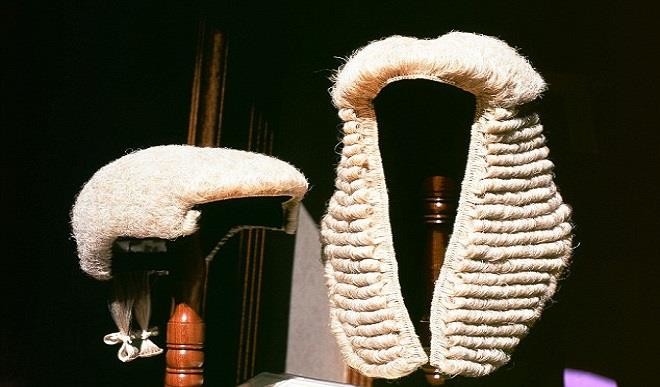Executive, judiciary, bickering: Who blinks first
When God wants to punish a nation, he visits them with bad and corrupt judges. Perhaps it is for this reason that at every opportunity that offers itself to President Muhammadu Buhari since he assumed office as president, he repeatedly said that the nation’s judiciary was his major headache. Apart from President Buhari, former President […]


When God wants to punish a nation, he visits them with bad and corrupt judges.
Perhaps it is for this reason that at every opportunity that offers itself to President Muhammadu Buhari since he assumed office as president, he repeatedly said that the nation’s judiciary was his major headache.
Apart from President Buhari, former President Olusegun Obasanjo equally lamented that the judiciary was corrupt more than a decade ago.
It is for this reason that the recent raid on judges’ homes at midnight should not take anyone by surprise.
Investigations revealed that there have been series of petitions against some judges who are perceived to be corrupt.
The petitions were not only sent to the National Judicial Council (NJC) but to virtually every conceivable security agency. These petitions at any rate are still mere allegations because no matter how strong an allegation may be against judges it should not amount to proof.
However it was gathered that in recent times, anyone arrested by the government for alleged corruption is in the eyes of the public guilty without trial.
On their part, our judges cannot defend themselves; they have to be defended by the NJC and lawyers. Already, many serving judges in the country have lost interest on the bench but are finding it difficult to resign their appointment.
Some judges who have already retired said that if they had the opportunity again they would not want to be judges, adding that they would rather be farmers.
However, it is better for nine criminals to escape than for one innocent person to be punished because there are chances that the criminal would still commit more crimes and one day would be caught.
Outgoing Chief Justice of Nigeria (CJN) Justice Mahmud Mohammed, challenged lawyers to expose the corrupt judges, but up until now hardly has any lawyer exposed any judge, either serving or retired.
The NJC, which is one of the federal executive bodies created by virtue of Section 153 of the 1999 Constitution, appears to be weak in fighting judicial corruption. Specifically, the NJC was created in order to insulate the judiciary from the whims and caprices of the executive so as to guarantee the independence of the judiciary.
“Over the years, while the NJC thought it was probably doing its job as well as it should, but outside its chambers, the impression was growing that it was quite laid back at best, and was letting illicit lucre become the new currency for judicial justice. With respect to the NJC, its approach did not clearly create sufficient disincentives or deterrents against corruption,” Joseph Otteh, Director Access to Justice said.
Otteh listed some of the weaknesses in the NJC’s approach to fighting corruption to include the overarching burden it puts on complainants; secondly the NJC disciplinary system is petition driven, not “allegations” driven.
According to him, this means that even where damaging allegations against judicial officers are made public, unless there is a specific petition by someone against the officer, the NJC will not investigate the case.
Lastly, Otteh said the NJC, in terms of outcomes, was systematically offering soft-landings to persons found wanting.
He, however added that “lately, the NJC tightened the noose, referring judges for prosecution, but whether this represents a new perspective in the fight against judicial corruption in this respect needs to be ascertained.”
However to the Department of State Security (DSS), the NJC’s action referring the cases of three judges to the police over serious crime was too little, and perhaps too late.
While the NJC has backed the judges, insisting that the DSS was attempting to cow and intimidate the judiciary, the Presidency concluded that “the actions of the DSS in the arrest and search of the premises of judges and justices can be placed firmly within the ambit of the law, sentimental and emotional considerations notwithstanding.”
Justifying the arrest of the judges, the presidential review panel said, “Nigeria is not the first country to investigate and prosecute judges that are suspected of commission of acts of crime. The Federal Bureau of Investigation (FBI) in the United States of America (a body similar to DSS) had at various times, prominently in January 2013, May 2014 and November 2015 arrested a number of judges for bribery, corruption and other similar offences; subjected the judges to trial at the end of which the convicted judges were imprisoned.
“Nearer to home, neighbours like Ghana and Kenya had also cleansed their respective judiciaries through investigation and prosecution of judges suspected of commission of corruption.
“While a particular federal judge had alleged that he signed at gunpoint, what really happened was that the judge was not arrested until his lawyer came on the scene on his request and affirmed that the search warrants were in order. While some of the judges in their statements said the foreign currencies found on them were from their unspent estacodes, a claim said to be untenable considering the sums of money involved; another judge was said to have explained the huge sums of money away as proceeds of his rice selling business.”
With the different positions of the presidency supporting the arrest and the NJC’s stand that the raids were to humiliate and cow the judiciary, one awaits the next step that would be taken by the executive – whether or not it will go ahead to prosecute.
In the event that it goes ahead, the cases would still end up with the judiciary. The problem however is that Nigerians might no longer get judges to settle their disputes on the long run, which also leads to anarchy.
